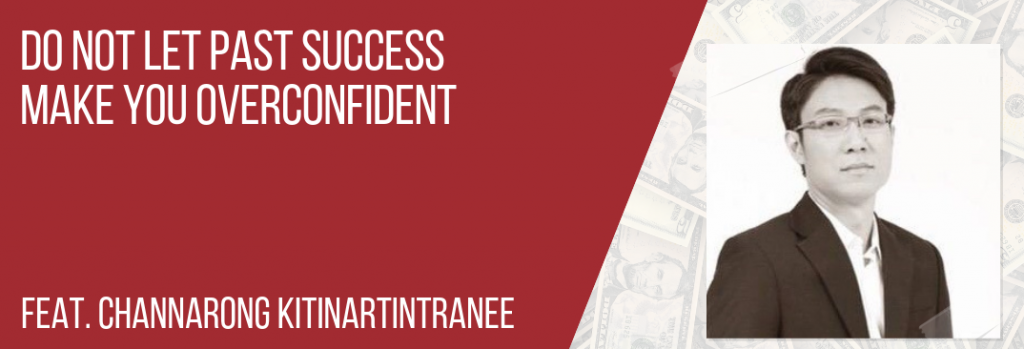Ep57: Channarong Kitinartintranee – Get Back to the Basics: Do Not Let Past Success Make You Overconfident

Listen on
Apple | Overcast | Stitcher | Spotify | Other
Guest profile
Do you let your past successes define your next investment decisions? Channarong Kitinartintranee did and it led to his worst investment to date.
Don’t forget the basic investment things, the valuation, the fundamental.
Channarong Kitinartintranee
How Going Back to Basics Can Save You from Illiquidity Issues
Channarong is currently Kasikornbank Private Banking Group’s Senior Financial Advisor. As a former mutual fund and institutional private fund portfolio manager at Krung Thai Asset Management, he was able to build a portfolio of mid-scale cap stocks amounting to 10 billion baht (319 million USD). His love for investing led him to acquire an MSc Finance degree from Thammasat University and a Chartered Financial Analyst (CFA) title. He said he’d rather invest his personal money in equities or bonds because he tends to spend a lot of it when he has cash on hand.
How One of His Best Investments Turned into His Worst
In 2017, Channarong decided to change his investing strategy and ride the trend of investing in mid to small-cap stocks. This change led his mutual funds to grow 5 times and rank 2nd highest in all of Thailand within a year. He decided to stick with this investment for the next 3 to 4 years and felt confident as he saw his stocks grow from 7 to 35 million baht, and ultimately to 150 million baht.
Things are going great until drastic changes happened. Mid to small-cap stocks started underperforming and everyone holding these in their portfolio shifted from passive to active management. They all had to let sell right away. At that time, Channarong faced a huge challenge of liquidating because of the size of the stocks he holds under this valuation. He carefully evaluated his portfolio and assessed which ones had liquidity risks and which ones have the potential to go up in the next few years and cover his losses.
But at the beginning of 2018, when the market started performing better, he made the same mistake. He relied on
Lessons: Hurt Pride and Forgetting the Fundamentals
When asked about the extent of the damage his mistake caused, Channarong said his financial losses weren’t big enough to put him at the bottom of the pack. The bigger impact on him is how the whole experience affected him emotionally.
One of his biggest realizations is how the upsides and downsides of investing can have a huge impact on him as a person. “It will change you and it can change your view,” he shared. Andrew shared that Jason Zweig’s book, Your Money and Your Brain, supports this and says investing causes a physical change in your body as it affects your mind and emotions. He challenged those who don’t believe that investing can have a physical reaction to try putting money in the stock market and lose 20% of it.
Channarong also shared how he forgot to apply the fundamental concepts he learned and reminded the listeners of how important it is to always go back to the basics, especially when managing a huge portfolio of assets. Some of the things he wished he applied to avoid his losses are:
- checking his stock’s intrinsic value,
- using Price/Earnings-to-Growth Ratio or P-E growth (current share price by its earnings per share) as an indicator of stock growth and liquidity,
- anticipating a downside despite foreseeing an upside in the near future, and
- not going overboard with acquiring stocks to be able to easily liquidate when needed.
Andrew mentioned other basic concepts that we all need to consider when investing:
- Exposure – There are 3 types of exposure to look out for: global drivers (e.g. oil price), factors such as valuation and momentum, and size (e.g. mid cap). Investing around factors of exposure can be difficult because you need to understand when these factors will go in or out of favor.
- Liquidity – Not considering the liquidity risks of your stocks can give you a hard time selling them when you need to.
Final Words: On Investing and Overconfidence
Channarong recommended that investors shouldn’t let their past successes make them overconfident when investing. Andrew compared an overconfident investor to a poker player who bases his betting decisions on his one lucky win. “Challenge your past successes. Don’t trust them.”, he advised.
After sharing his experience, Channarong encouraged the listeners to keep investing as it will open lots of opportunities for wealth, success, and even early retirement. Andrew emphasized that everyone must take advantage of the compounding effect, as Warren Buffet advocates and illustrates in his book “The Snowball: Warren Buffett and the Business of Life”.
View the full transcript: Click Here
Resources mentioned:
- Your Money and Your Brain by Jason Zweig
- The Snowball: Warren Buffet and the Business of Life by Warren Buffett
Connect with Channarong Kitinartintranee:
Andrew’s books
- How to Start Building Your Wealth Investing in the Stock Market
- My Worst Investment Ever
- 9 Valuation Mistakes and How to Avoid Them
- Transform Your Business with Dr.Deming’s 14 Points
Andrew’s online programs
- Valuation Master Class
- Women Building Wealth
- The Build Your Wealth Membership Group
- Become a Great Presenter and Increase Your Influence
- Transform Your Business with Dr. Deming’s 14 Points

